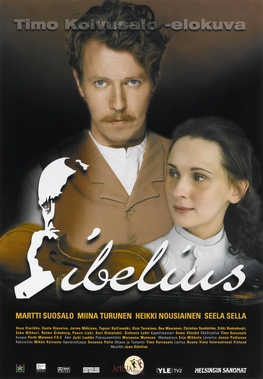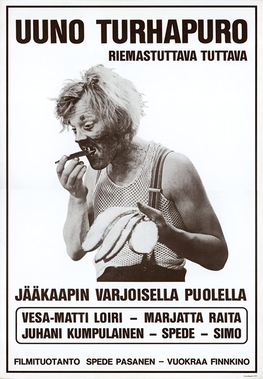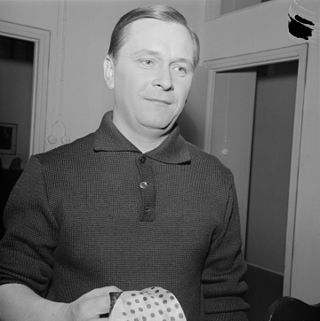
Pertti Olavi "Spede" Pasanen was a Finnish film director and producer, comedian, and inventor, who has been called an "all-around entertainer". During his career he directed, wrote, produced or acted in about 50 movies and participated in numerous TV productions, including the comedy Spede Show and the game-show Speden Spelit. Much of his more commercial work was in collaboration with Vesa-Matti Loiri and Simo Salminen. Pasanen's films and TV shows, often made quickly and on a low budget, usually received little critical recognition but were popular among Finnish audiences from the 1960s onwards. He was the owner of his own film production company, Filmituotanto Spede Pasanen Ky. Pasanen was ranked 17th at the Suuret suomalaiset competition show broadcast by Yleisradio.

Turun Palloseura, commonly known as TPS, is a professional football club based in Turku, Finland. Since 2024, the men's team competes in Ykkösliiga, the second highest tier. The women's representative team in the Kansallinen Liiga, the highest level of women's football in Finland. Nicknamed "Tepsi", the club was founded in 1922.
Profanity in Finnish is used in the form of intensifiers, adjectives, adverbs and particles, and is based on varying taboos, with religious vulgarity being very prominent. It often uses aggressive mood which involves omission of the negative verb ei while implying its meaning with a swear word.

Pähkähullu Suomi is a 1967 comedy by Spede Pasanen. It is the third film starring Spede in a contemporary comedy after X-Paroni and Millipilleri. The film's release coincided with the 50th anniversary of the Finnish declaration of independence which is also referenced in the film.

Erkki Olavi "Ere" Kokkonen, born in Savonlinna, was a Finnish film director and screenwriter.

Sibelius is a 2003 Finnish film biography of Jean Sibelius directed and written by Timo Koivusalo. It is the first full-length feature film about the famous composer.
Heikki Nousiainen is a Finnish film and television actor. Nousiainen made his acting debut in the television movie Henrik ja Perinlla in 1967. He entered film in 1971, as both a director and an actor in Saatanan radikaalit and has made over 40 Finnish film and TV appearances to date. He has worked with Finnish director Timo Koivusalo on a number of films such as Sibelius in 2003 and Kaksipäisen kotkan varjossa (2005), as well as in other Finnish movies and TV series. In 2006 he starred in 3 different films. Nousiainen is also known as playing President Urho Kekkonen in TV series Vallan miehet (1986), Presidentit (2006) and Piru ja peijooni (2008).
Paavo Piironen was a Finnish film and television actor, director and writer of the 1960s and early 1970s. He is perhaps best known for his work on the 1971 film comedy Saatanan radikaalit in which he starred and co-directed alongside Heikki Nousiainen, Timo Nissi and Heikki Huopainen.

Kauko Olavi Ahonen was a Finnish film actor.

Uuno Turhapuro is a 1973 Finnish comedy film directed by Ere Kokkonen, and the first, black and white Uuno Turhapuro film. It stars Vesa-Matti Loiri, Marjatta Raita, Pertti Pasanen, and Simo Salminen.

The Unhanged is a 1971 Finnish western comedy film directed by Spede Pasanen and Vesa-Matti Loiri. It is the sequel to the 1970 film Speedy Gonzales - noin 7 veljeksen poika. In addition to featuring Pasanen and Loiri, the film also stars Pasanen's other stock actors, such as Simo Salminen and Olavi Ahonen. The two main characters are parody versions of The Lone Ranger and his sidekick Tonto.
Juhani "Juhku" Kumpulainen was a Finnish actor and director. He did a total of 85 movie roles between 1950 and 1991. Kumpulainen was also the official YLE's administrative and organizational tasks as well as Tesvisio facility manager.

The Winter War is a 1989 Finnish war film directed by Pekka Parikka, and based on the novel Talvisota by Antti Tuuri. It is set in the 1939 Winter War and tells the story of a Finnish infantry regiment from Southern Ostrobothnia fighting on the Karelian Isthmus, focusing mainly on a platoon of reservists from Kauhava.

Ville-Veikko Salminen was a Finnish film, television, stage actor and director. He was one of the founders of the acting companies for both Yleisradio and Mainostelevisio. He is best remembered for his roles in the films of Spede Pasanen, often playing a handsome, suave womanizer - but also had an extensive career in films and TV outside his films.

Uuno Turhapuro muuttaa maalle is a 1986 Finnish comedy film, the 11th film in the Uuno Turhapuro film series.

Forbidden Fruit is a 2009 Finnish drama film directed by Dome Karukoski. The film is about two teenage girls from a Conservative Laestadian community. The girls travel to Helsinki where they meet other people of their age and learn about their lifestyle that differs greatly from the girls' religious way of life.

Leo Paavali Jokela was a Finnish actor. He is best remembered for his role as a detective Kokki in Matti Kassila's Komisario Palmu films and as a parrot G. Pula-aho in Spede Pasanen's radio programs.
Ladies of Steel is a 2020 Finnish road comedy-drama film directed by Pamela Tola.












